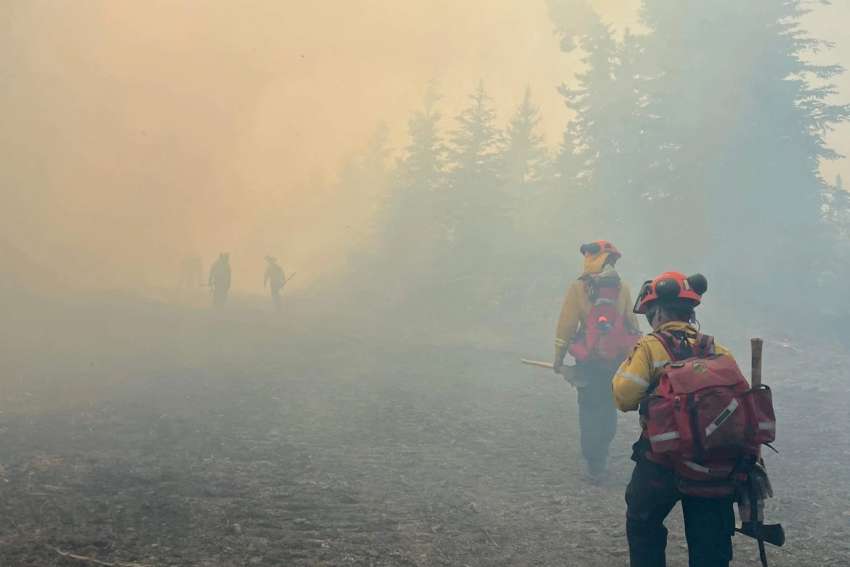One would be forgiven for mistaking these scenes in Yellowknife and Kelowna for the trailer of an end times movie. More such images are expected to play out as over 1,000 out-of-control wildfires rage across Canada.
People quoted in media reports describe the “apocalyptic” flight from red and yellow flames and skies filled with grey haze and black smoke. It’s not unreasonable to view Canada’s forest fires through an end times lens. These images remind us natural disasters are one of many signs found in Scripture describing the lead-up to Christ’s second coming.
If we’re to examine the Canadian wildfires from an end times perspective, we should do so by discerning what the fires can teach us about our own lives rather than speculating about possible end times dates or searching for more signs that the end of the world is near.
First, there’s the metaphor of advanced warning. Using sophisticated technologies, officials in the Northwest Territories (NWT) had been monitoring the spread of wildfires. When the fires approached Yellowknife, the government issued an evacuation order Aug. 16.
To Yellowknife Mayor Rebecca Alty’s relief, 95 per cent of residents had left the city by the Aug. 18 evacuation deadline, but she noted in a CBC interview the following day that 1,600 people — excluding emergency workers — remained: “Please, the highway is open, get in your vehicle, head out, there’s also flights today… We’re really urging people to act now because we want to do this before there’s a critical emergency.”
Like the government authorities, Scripture and the Catholic Church urge us to look ahead and “act now.” Each of us have a personal end to life on Earth. There is Heaven and hell. Jesus Christ will return to an Earth that has been transformed by many upheavals. We know these things, yet we know not the day nor the hour. We are told many times: Be prepared.
Are we too complacent about preparing for eternity? Are we in denial or disbelief regarding Church and Scriptural teachings about the afterlife and the Second Coming? Do we minimize the importance of getting right with God and each other, thinking we’ll do so “one day,” a day that might never come? Do we fail to recognize signs in society and in ourselves that we’re on a path contrary to God’s will and teachings?
Then there’s the metaphor of a plan. Following the British Columbia and Northwest Territories’ declarations of states of emergency, authorities implemented measures to prevent loss of life and to slow or stop the fires from spreading.
NWT created an evacuation plan for communities all over the Territory. Yellowknife’s strategy involved logistics for road and air travel, military transport of civilians and health care patients to facilities in the south, and liaising with reception centres set up in Alberta and British Columbia, among other measures.
Are we as a Church and as individuals creating roadmaps to save souls from eternal fire? Do we have a personal plan to discern God’s will for our earthly and eternal life through regular Mass attendance, daily Bible reading and prayer, spiritual direction, among other activities? Do we help each other out when times are tough?
Then there’s the metaphor of cause and effect. The 2023 wildfire season is the worst ever recorded, according to the Canadian Forest Centre. The fires have added one billion tonnes of carbon dioxide emissions into the atmosphere as well as destroying 14 million hectares of forest so far this year.
Rising temperatures have made landscapes drier. Research shows every degree rise in global average air temperatures results in 12 per cent more lightning strikes, a key cause of forest fires. Sparks arising from strikes turns dry vegetation into tinderboxes.
Greenhouse gases and other pollution generated by human consumerism and environmental mismanagement have brought about more arid landscapes, among many other impacts.
Let’s examine our choices and behaviours that lead us to sin and the harm sin causes: How seriously do I take sin? How vigilant am I to avoid it? Do I regularly confess, and atone for, my sins? Am I preparing for eternal life?
Let the wildfires spur us on to contemplate where we’re going as a Church, as a society and as individuals. Let’s ask God for the discernment and strength we need to prepare for what lies ahead.
(Majtenyi is a public relations officer specializing in research at an Ontario university.)


